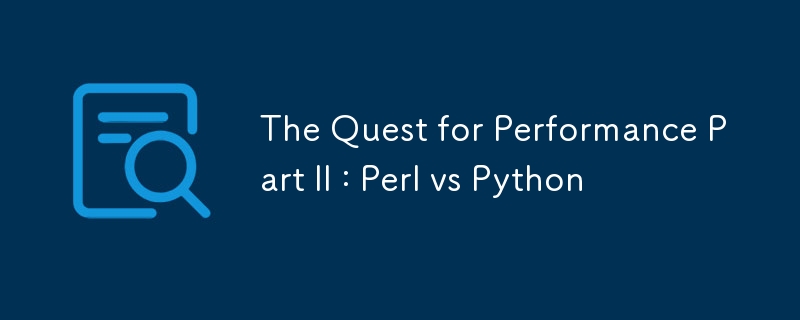

Après avoir exécuté un exemple de performance de jouet, nous allons maintenant m'éloigner quelque peu et comparer la performance avec
quelques implémentations Python. Commençons par préparer le terrain pour les calculs et fournissons la ligne de commande
capacités du script Python.
import argparse import time import math import numpy as np import os from numba import njit from joblib import Parallel, delayed parser = argparse.ArgumentParser() parser.add_argument("--workers", type=int, default=8) parser.add_argument("--arraysize", type=int, default=100_000_000) args = parser.parse_args() # Set the number of threads to 1 for different libraries print("=" * 80) print( f"\nStarting the benchmark for {args.arraysize} elements " f"using {args.workers} threads/workers\n" ) # Generate the data structures for the benchmark array0 = [np.random.rand() for _ in range(args.arraysize)] array1 = array0.copy() array2 = array0.copy() array_in_np = np.array(array1) array_in_np_copy = array_in_np.copy()
Et voici nos candidats :
for i in range(len(array0)): array0[i] = math.cos(math.sin(math.sqrt(array0[i])))
np.sqrt(array_in_np, out=array_in_np) np.sin(array_in_np, out=array_in_np) np.cos(array_in_np, out=array_in_np)
def compute_inplace_with_joblib(chunk): return np.cos(np.sin(np.sqrt(chunk))) #parallel function for joblib chunks = np.array_split(array1, args.workers) # Split the array into chunks numresults = Parallel(n_jobs=args.workers)( delayed(compute_inplace_with_joblib)(chunk) for chunk in chunks )# Process each chunk in a separate thread array1 = np.concatenate(numresults) # Concatenate the results
@njit def compute_inplace_with_numba(array): np.sqrt(array,array) np.sin(array,array) np.cos(array,array) ## njit will compile this function to machine code compute_inplace_with_numba(array_in_np_copy)
Et voici les résultats du timing :
In place in ( base Python): 11.42 seconds In place in (Python Joblib): 4.59 seconds In place in ( Python Numba): 2.62 seconds In place in ( Python Numpy): 0.92 seconds
Le numba est étonnamment plus lent !? Cela pourrait-il être dû à la surcharge de compilation, comme l'a souligné mohawk2 dans un échange IRC sur ce problème ?
Pour tester cela, nous devrions appeler computing_inplace_with_numba une foisavantd'exécuter le benchmark. Cela montre que Numba est désormais plus rapide que Numpy.
In place in ( base Python): 11.89 seconds In place in (Python Joblib): 4.42 seconds In place in ( Python Numpy): 0.93 seconds In place in ( Python Numba): 0.49 seconds
Finalement, j'ai décidé de prendre la base R pour rouler dans le même exemple :
n<-50000000 x<-runif(n) start_time <- Sys.time() result <- cos(sin(sqrt(x))) end_time <- Sys.time() # Calculate the time taken time_taken <- end_time - start_time # Print the time taken print(sprintf("Time in base R: %.2f seconds", time_taken))
qui a donné le résultat de timing suivant :
Time in base R: 1.30 seconds
Par rapport aux résultats Perl, nous notons ce qui suit à propos de cet exemple :
Ce qui précède est le contenu détaillé de. pour plus d'informations, suivez d'autres articles connexes sur le site Web de PHP en chinois!
 Comment utiliser l'outil de capture de paquets HttpCanary
Comment utiliser l'outil de capture de paquets HttpCanary Classement des prestataires de services CDN étrangers
Classement des prestataires de services CDN étrangers Que faire si le module spécifié est introuvable
Que faire si le module spécifié est introuvable Quelles sont les principales différences entre Linux et Windows
Quelles sont les principales différences entre Linux et Windows Comment résoudre le crash du Webstorm
Comment résoudre le crash du Webstorm Méthode d'ouverture de l'autorisation de portée
Méthode d'ouverture de l'autorisation de portée échange de devises
échange de devises Solution au problème selon lequel l'entrée n'est pas prise en charge au démarrage de l'ordinateur
Solution au problème selon lequel l'entrée n'est pas prise en charge au démarrage de l'ordinateur